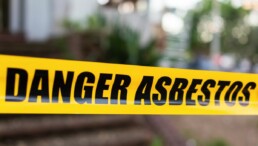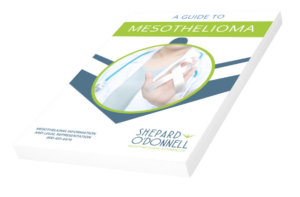What is “Loss of Consortium” and Do I Have a Claim?
When a loved one is diagnosed with mesothelioma or lung cancer, you and your family members may have a lot of questions. How did they get this disease? What treatments are available? Will I need to take time off work to help care for them? Another question that may come up is: Can we get financial compensation for their injuries?
If, after speaking with an experienced mesothelioma attorney, the answer is yes, you might also consider seeking compensation for the suffering you and any dependent family members will potentially have to go through. While the pursuit of financial compensation for mesothelioma and lung cancer victims is certainly the primary injury claim, there is an often overlooked aspect of these lawsuits: the impact on the injured’s family. This is called a loss of consortium claim.
What is Loss of Consortium?
A devastating medical diagnosis impacts not just the individual diagnosed but the whole family. In close marital relationships, the spouse bears the burden of illness alongside their husband or wife, both during the course of the disease and, even more acutely, following the death of their loved one.
Loss of consortium refers to the loss of marital benefits that a spouse enjoys throughout marriage and includes not just financial considerations, but all aspects of the person’s personal life: love, companionship, comfort and care, emotional and moral support, sexual relations, social activities, as well as daily tasks, chores and errands. In Massachusetts, the victim’s minor children or disabled adult children, also have a right to a loss of consortium claim.
In essence, loss of consortium is a claim that seeks compensation for the loss of the richness and fullness of a relationship, whether marital or parent-child and encompasses many things including:
- Loss of Emotional Connection: When a mesothelioma or lung cancer victim can no longer provide the love and emotional support they once did, family members understandably experience sadness and loneliness at the loss of a meaningful emotional connection. Whether it’s the unconditional love of a spouse or the unfailing moral support and guidance of a parent, the emotional toll of that loss is devastating.
- Loss of a Life Partner: Marriage is a partnership. You are partners in child-rearing, caring for your home and garden, cooking, cleaning, laundry, planning medical appointments and much more. When one partner becomes too weak to help, the other must shoulder added responsibilities and duties, which can lead to stress and exhaustion.
- Loss of Parental Support and Guidance: In Massachusetts, loss of consortium includes the loss of a parent. Parents play an important role in shaping their children’s futures and are often instrumental in providing guidance in education, careers or personal and family life. As a key influence in a child’s life, the loss of a parent can have a significant negative impact on that child’s future.
- Loss of Income: If the injured spouse is unable to work, and/or if you need to give up your job to act as a caregiver, this can put a significant strain on a family’s finances, especially as medical bills start piling up.
- Loss of Social Connection: As your spouse gets weaker, he or she may be unable to participate in social events. You may be hesitant to engage in social activities alone, which could lead to social isolation and an increased risk of depression.
What Does a Loss of Consortium Claim Mean for Your Family?
A loss of consortium claim recognizes that it is because of someone else’s negligence (that is, the companies that knowingly put workers in danger from asbestos) that you are now put in a position to cope with your loved one’s illness, shoulder the burden of maintaining a household, and face a life without a spouse or parent. Companies that knowingly exposed their employees to harmful substances such as asbestos should be held accountable for their actions, not only against the victims themselves, but also the family members who suffer alongside them.
Financial compensation for loss of consortium can help families get through the trying times during the course of the illness, particularly if you’ve had to leave your job to care for your spouse. In addition to household and family responsibilities, you might also need to hire extra help around the house or yard, rearrange living spaces to accommodate medical equipment, or order special meal services to support the patient’s treatment and recovery.
A loss of consortium claim entitles you to recover damages for the entire length of time the injury caused the loss.
How Can I File a Loss of Consortium Claim?
Each marriage and family is unique; therefore, each loss of consortium case is unique. The foundation of a strong loss of consortium claim is proof of a strong marriage and family bond in which family members enjoy interconnected and mutually supportive lives. An experienced mesothelioma lawyer can help advise what claims are best to pursue based on your specific circumstances.
If you or a family member have been diagnosed with mesothelioma, regardless of whether through direct or secondary exposure to asbestos, you may have a claim. Unfortunately, in addition to direct jobsite exposure, we have seen instances of mesothelioma in wives who routinely did their husband’s asbestos-covered laundry, or in children who hugged dad every day as he came home from work in clothes embedded with asbestos fibers. Call us today to determine your next steps, and we’ll help you navigate the process. At Shepard O’Donnell, we have helped hundreds of individuals and their families get justice for their injuries, regularly obtaining settlements and verdicts in the millions. We are happy to offer you a free case evaluation and will tell you honestly if we think you have a viable claim, including a claim for loss of consortium.
Mesothelioma Legal Question: How Long Do I Have to File A Mesothelioma Lawsuit?
As another new year begins and we are all thinking about intentions and resolutions for the coming months, we’d like to add a specific and urgent task to your list: contact a lawyer as soon as possible if you or a loved one has been diagnosed with mesothelioma.
Mesothelioma is an aggressive form of cancer that, once diagnosed, often leaves victims and their families little time to put their affairs in order. Despite the fact that the disease has likely been developing for many years, once you learn that mesothelioma is the cause of the cancer, the clock starts running for you to initiate a potential legal claim.
Nothing can ease the pain of a mesothelioma diagnosis. However, obtaining fair compensation from those responsible for your injuries has the power to ensure your family’s financial security.
The Magic Number: 3 Years (Or More?)
One of Massachusetts’s most frequently asked mesothelioma legal questions is when a lawsuit can be filed. The statute of limitations for personal injury cases in the Commonwealth, including those involving mesothelioma, is three years. This means that you have three years from either 1) the date of your mesothelioma diagnosis, or 2) when you knew or reasonably should have known about the probable link between your diagnosis and prior exposure to asbestos, to file a claim.
It is important that you contact a lawyer as soon as possible after learning you or a loved one has mesothelioma, even if you think you may be outside of the three-year time limit. In certain circumstances, that time frame may have been tolled, or paused, as was the case with the statute of limitations during the COVID-19 pandemic. Your lawyer can tell you if the deadline in your case can be extended past the typical three-year mark. Be sure to contact an attorney intimately familiar with mesothelioma lawsuits in Massachusetts to get the best possible advice for your specific case.
We are happy to provide our honest opinion about whether you have a valid mesothelioma legal claim in Massachusetts, free of charge. Don’t worry if you don’t have your medical records or employment details at hand: we’ll help you obtain whatever documentation we need to build a strong case.
Talk to Your Doctor As Soon As Possible
We recommend talking to your doctor right away if you think you may have been exposed to asbestos at any point during your working years, particularly if you’ve worked in industries such as shipping, plumbing, construction, paper mills and others, or if you are a Veteran. Set up regular monitoring of your lung health, such as annual lung scans or other checks to ensure you spot potential symptoms of mesothelioma as early as possible. We urge you not to ignore the warning signs of mesothelioma which include:
- Shortness of breath
- Difficulty breathing
- Difficulty swallowing
- Chest pains
- Coughing blood
- Loss of appetite
- Sweating (profusely)
- Weight loss
Talk to your doctor right away if you experience any of these symptoms and be sure to let them know about your past asbestos exposure.
Remember: the earlier the diagnosis, the more treatment options may be available to you or your loved one, and the greater the likelihood of recovery.
If you do experience any of these symptoms, or have been recently diagnosed with mesothelioma, we also encourage you to talk to your family about your work history to begin putting the puzzle pieces together about when, where and how you may have been exposed to asbestos. Since the only known cause of this disease is asbestos exposure, it is important to establish and document that history, particularly if you plan to pursue a lawsuit. Let your loved ones know how you may have been exposed to asbestos, what employers you worked for, which job sites you worked at, what equipment you used and who your co-workers were. All of this information will be important to a successful legal claim and the sooner we begin building your case, the greater the likelihood you will be awarded compensation. Read more about what to do if a family member has been diagnosed with mesothelioma.
Think About Possible Secondary Asbestos Exposure
When asbestos dust settles into clothing, furniture, shoes, hair, car upholstery and elsewhere, it can be re-released into the air when disturbed. Because of this, some people have unknowingly exposed loved ones to asbestos at home, even if that loved one has never worked around asbestos themselves. Sadly, a simple welcome-home hug could send fibers into the air to be breathed in by family members.
Unfortunately, this unwitting transfer is the primary method by which many women and children were exposed to asbestos in the early to mid-1900s. We’ve seen first-hand the terrible suffering of one of our clients who developed mesothelioma as a result of doing her husband’s laundry over many years: the asbestos dust embedded in his clothing became dislodged as she handled the items and she then breathed in those toxic fibers. This was a devastating burden to bear for her husband; however, since they were able to put the pieces together of how she developed mesothelioma, they were able to receive substantial compensation for her injuries.
If you or a close family member worked around asbestos during their lifetime and has developed mesothelioma, we encourage you to think about whether you might be able to seek financial compensation for their suffering. Understandably, an overwhelming sense of guilt leads some people into denial, but rest assured, there was no way to know about the dangers of asbestos fibers if the companies didn’t tell you about them.
Companies that knowingly perpetuated the use of this harmful material for decades after it was known to be dangerous should be held accountable. It was their responsibility to warn purchasers and users about the true hazards, and to list the precautions that should be taken to fully protect against exposure to asbestos from their products. They didn’t and allowed hundreds of thousands of people to suffer.
Time Is Of The Essence
Many mesothelioma victims are successfully filing lawsuits in Massachusetts to get the compensation they deserve. However, in order to recover maximum financial awards for your asbestos-related injuries, it is important to file a claim as quickly as possible to ensure that your claim falls within the three-year statute of limitations, and that we have time to gather the evidence we need regarding your work history and potential exposure.
Call us today if you think you might have a mesothelioma legal claim and we will help you navigate the process. At Shepard O’Donnell, we have helped hundreds of individuals and their families get justice for their injuries, regularly obtaining settlements and verdicts in the millions. We are happy to offer you a free case evaluation and will tell you honestly if we think you have a viable claim.
My Parent Has Been Diagnosed With Mesothelioma. What Do I Do Now?
Practical Answers To Common Questions
Learning that your father, mother, or any family member, has been diagnosed with mesothelioma is devastating, made more so by the fact that it is a preventable disease for which there are few treatment options. In addition to shock, confusion and sadness, you are probably wondering how to deal with this new reality going forward while ensuring your loved one gets the best care and support possible.
While some questions are best answered in the doctor’s office, others are not and you may be at a loss to know what to do next. At Shepard O’Donnell, we have worked with many families in your situation and can offer some guidance about the weeks and months ahead. While preparing hundreds of successful mesothelioma lawsuits, we often act as a resource for our clients and offer support whenever we can.
Here are some of the most common questions we are asked:
Q: Can I Get Financial Help To Pay The Bills?
A: Investigate All Options, Including Filing A Lawsuit.
As a first step, educate yourself about all available programs and assistance, including VA benefits if your parent qualifies, and start the application process. This disease often requires aggressive intervention in the form of surgery, radiation, and/or chemotherapy and your parent will need care and support to help him or her through. While cost might not initially be your main concern, the bills will soon start adding up.
Insurance and other benefits may only cover a portion of your medical bills. We encourage you to contact a local attorney or firm, such as Shepard O’Donnell, to determine if you have a potential mesothelioma legal case.
Q: How Can I Help Build A Legal Case?
A: Talk To Your Parents About Their Work History Now.
We understand that your priority is educating yourself about the disease and treatment plan, but we also urge you to talk to your parent about how he or she might have developed mesothelioma. Since the only known cause of the disease is asbestos exposure, it is important to establish how and when that exposure occurred, particularly if you plan to pursue a lawsuit.
We encourage our clients to talk to their parents about their work history as soon as possible; unfortunately, once diagnosed, this disease progresses relatively quickly, and treatment and medications can impact memory and the ability to communicate later on. Ask questions about whether they remember working with asbestos, what employers they worked for, which job sites they worked at, what equipment or tools they may have used, who their co-workers were and whether they have contact information for anyone associated with that job. To successfully pursue compensation from companies that willfully ignored the dangers of asbestos, you will need to provide as much specific information as possible about your parent’s exposure. (If your parent is a military veteran, you can reassure him or her that we will not pursue damages from the military, rather, we seek compensation from the manufacturers of the asbestos-containing products themselves.)
Q: What Other Documents Should I Look For?
A: Gather Together All Important Information To See If Anything Is Missing.
In addition to collecting information about your parent’s detailed work history, there are a number of other documents you should start compiling and/or preparing. For example, does your parent have a current will and/or a living will? A designated health care proxy? Are bank accounts in both parents’ names? Is the house in both names? Unfortunately, the prognosis for this disease is often poor and having important documents at hand when you need them will ensure things run smoothly and quickly later on. Other paperwork to locate includes health and life insurance policies, banking information, social security information, and military records. Often overlooked, but also important, are passwords and PIN numbers for various accounts, and contact information for friends and family. Call us and we can help with these important documents.
Q: Do I Need to Worry About Getting Mesothelioma Myself?
A: Probably Not.
You may be wondering if you yourself should be concerned about developing this disease. There is no genetic or hereditary component to mesothelioma since it develops solely as a result of asbestos exposure. That said, there have been many cases in which individuals who were exposed at work unknowingly brought asbestos back into the home. While workers who have been in close contact with asbestos are at the highest risk, it is critical to let your doctor know as early as possible if there’s even a small chance you may have been exposed to asbestos. If you aren’t currently experiencing any symptoms, but are concerned about possible past exposure, ask your doctor to set up regular monitoring. However, keep in mind that not everyone who has been exposed to asbestos will get mesothelioma or other cancers.
If you or a loved one does develop mesothelioma through asbestos brought into the home, you too could have a case. For example, we were able to secure a significant settlement for a client who developed mesothelioma as a result of laundering the clothing of her husband, who worked at a facility that coated and cut asbestos paper for use in making gaskets.
Q: What Can I Do To Support Both My Parents?
A: Sometimes Little Things Go A Long Way.
Talk to the doctor to see how you and your family can keep your loved one as healthy and strong as possible, for as long as possible. This includes providing balanced meals to maintain a healthy weight so they are better able to tolerate treatment. The American Cancer Society has useful information about the importance of good nutrition during treatment. If preparing meals seems like a daunting task, there are several meal delivery services available in Massachusetts, including Community Servings whose mission it is to actively engage the community to provide medically tailored, nutritious, scratch-made meals to chronically and critically ill individuals and their families. We have also developed some recipes for healthy and nourishing smoothies that our clients enjoy.
Practical actions such as decluttering the house or bringing items necessary for daily living – including hobbies and diversions – onto one level, will be helpful in the long run. Identifying which supports may be required in the future and whether hospice or palliative care might be required are some things you can look into now to ensure peace of mind later. If possible, prepare for the future together so you can understand your parent’s goals and wishes for the end of life. Also, understand that each person’s stress, anxiety, and fear will manifest in different ways: some people retreat into themselves, some lash out. Remember not to take potential bad behavior personally.
While this is certainly a serious time, allow your parents permission to be happy during the last months. If they’re up for it, plan fun events and allow some time to laugh and enjoy life together.
Q: How Am I Going to Manage It All?
A: Be Sure To Take Care of Yourself, Too.
After the initial shock of the diagnosis, you are probably wondering what this means for your daily life. Your days are likely already full with work and other obligations such as driving the kids to practice, managing your own household and upholding various commitments. How will you find the time to deal with everything that needs to be done?
Talk to your employer about whether you qualify for some time off under the Family Medical Leave Act, or FMLA, to give you some breathing room. Above all, we urge you and all family members to take care of themselves: eat right, try to fit in some physical activity every day, get good quality sleep, and perhaps start a meditation or mindfulness practice. Don’t be afraid to ask for help from friends or extended family and consider joining a support group for mesothelioma victims, such as these in-person and virtual options offered through Brigham and Women’s Hospital in Boston. Or contact us and ask us to connect you with family members of mesothelioma victims that you can talk to about tips for coping with this difficult situation.
We Are On Your Side
You and your family are undoubtedly experiencing emotional stress and trauma as you deal with this painful time in your lives. Make sure you find an attorney for whom you are not just a number on a spreadsheet or a docket. We are responsive, compassionate, and sincere. If you have any other questions, we are ready to help you find answers.
At Shepard O’Donnell, we have helped hundreds of individuals and their families get justice for their injuries, regularly obtaining settlements and verdicts in the millions. We are happy to offer you a free case evaluation and will tell you honestly if we think you have a viable claim. Read more about the importance of hiring a local attorney.
Why You Need Legal Advice When Diagnosed With Mesothelioma
MESO Series: Part III
Why You Need Legal Advice When Diagnosed With Mesothelioma
We’ve said it before and we’ll say it again: The fact that mesothelioma patients and their families have had to endure pain and suffering, both financial and emotional, as a result of the callous actions of manufacturers of asbestos-containing products is unconscionable. Companies that knowingly perpetuated the use of this harmful material for decades after it was known to be dangerous should be held accountable. Today, many victims are successfully filing lawsuits in Massachusetts to get the compensation they deserve.
Following a mesothelioma diagnosis, medical bills can start adding up quickly. From initial doctor consultations, to chemotherapy or radiation, to surgery and at-home care, even the best insurance won’t cover the mounting costs. You and your family deserve the peace of mind that comes with knowing an experienced attorney is on your side and will fight for your right to financial compensation to secure your family’s future.
Mesothelioma law firms typically offer a free consultation to discuss a potential case and most firms will only require a fee or out-of-pocket expenses once they win. Legal proceedings will not affect your medical care, insurance, or benefits like Social Security, Medicare, disability, veterans benefits, or retirement.
There is no downside to seeking legal advice and there may well be a significant financial upside.
Whom To Contact for Help
Almost 2,000 mesothelioma lawsuits were filed nationwide in 2022 against a broad range of manufacturers of asbestos-containing products. Although many corporate entities have since declared bankruptcy to avoid paying for their actions, an estimated $30 billion is available from asbestos trust funds that have been established to help compensate victims.
If you were exposed to asbestos during the course of your employment – including service in the U.S. military – and have since developed mesothelioma, we encourage you to contact a mesothelioma lawyer as soon as possible to determine whether or not you are eligible for compensation. If you are a U.S. mIlitary veteran with mesothelioma, you may also be eligible for VA benefit programs and we encourage you to reach out to your local VA for assistance.
How to Choose the Right Law Firm
Before deciding which firm to choose to represent you in your mesothelioma lawsuit, you should do some research to maximize your potential compensation. These types of cases are highly specialized and only a few legal professionals in the Commonwealth of Massachusetts have experience with mesothelioma lawsuits.
As we outlined in a previous post, there are a number of questions you should ask before hiring a lawyer to defend your rights in a Massachusetts mesothelioma case:
- Do they understand Massachusetts law?
- Do they know all potential defendants to include in your suit?
- Have they tried a case exactly like yours before?
- Are they part of the local legal community?
- Do they have “boots on the ground” in MA?
- Are they personally available to you and your family?
- Who will pay for their travel costs (especially if they are out of state)?
- Do they truly care about you and your family?
- Do they win?
Learn about the answers you should be looking for and why local experience matters most when hiring a mesothelioma litigation firm in Massachusetts in our blog post here.
Don’t Miss Out On The Compensation You Deserve
The litigation process can be intimidating and confusing. At Shepard O’Donnell, we take the time to explain the process from beginning to end, setting realistic expectations and timelines. If you are unable to come to our offices due to health or other reasons, we will come to you to listen to your story (even if you live in another state) and tell you honestly if we think you have a viable claim. We want you to be comfortable with the process and learn enough about it so you aren’t surprised by the many steps involved. The legal process does not have to take over your daily life. Our attorneys work diligently in the background, dealing with all the hassles of the litigation process so you don’t have to, allowing you to concentrate on what’s most important—your health and your family.
If you think you might have a mesothelioma case in Massachusetts, we encourage you to reach out to Shepard O’Donnell. We have helped hundreds of individuals and families obtain justice for their injuries, regularly obtaining settlements and verdicts in the millions. And you will never pay unless we deliver results for you.
Mesothelioma Legal Question: How Long Do I Have to File A Mesothelioma Lawsuit?
January 18, 2024
1 Comment9 Minutes
My Parent Has Been Diagnosed With Mesothelioma. What Do I Do Now?
November 21, 2023
1 Comment12 Minutes
Mesothelioma Diagnosis, Prognosis, and Treatment Options
MESO Series: Part II
Diagnosis, Prognosis, and Treatment Options
The typical mesothelioma patient is a man around retirement age with a blue-collar or military background. The relatively advanced age of patients is due to the long latency period of this disease, which typically manifests between 20-50 years after exposure to asbestos. Cruelly, it is just as workers are set to enjoy their retirement years, that they are diagnosed with mesothelioma. While workers who have been in close contact with asbestos are at the highest risk, family members can also be at risk via exposure to fibers brought home on the clothing of the primary individual.
If you or someone you know has experienced any of the symptoms outlined in our previous post, we encourage you to seek medical attention right away. It is critical to let your doctor know as early as possible if there’s even a small chance you may have been exposed to asbestos during your working years. If you aren’t currently experiencing any symptoms, but are concerned about possible past exposure, ask your doctor to set up regular monitoring. However, keep in mind that not everyone who has been exposed to asbestos will get mesothelioma or other cancers.
How Do You Diagnose Mesothelioma?
Mesothelioma can be difficult to diagnose because it often looks like other types of cancer, or even benign illnesses such as pneumonia, flu, or intestinal issues. Your doctor will likely use a variety of diagnostic tools, including a physical exam, blood and tissue tests, x-rays and other imaging scans, and biopsies to determine whether or not mesothelioma is present. If mesothelioma is diagnosed, these tests also help determine how far it has progressed and whether it has spread to other parts of the body. The cancer can spread via tissue, the lymph system, or the blood.
The process used to find out if cancer has spread outside the pleura (lungs) or peritoneum (abdomen) is called staging. As with other cancers, there are four stages of the disease. Doctors will ask questions such as: How far has cancer spread in the pleura? Has it spread into other nearby pleura or structures? Can it be removed with surgery? Has the cancer spread to nearby lymph nodes? Has the cancer spread to distant organs, like the bones, liver, lungs, or pleura (lining of the lung) on the other side of the body, or the peritoneum (lining of the abdomen)?
Depending on the answers, pleural mesothelioma, for example, can be divided into four stages:
- Stage 1: Cancer is only in the pleura. At this stage, you may be a candidate for treatments like surgery to remove the cancer.
- Stage 2: Cancer may have spread beyond your pleura, but it’s still near the original site. At this stage, surgery plus chemotherapy or radiation may be indicated.
- Stage 3: Cancer has spread to nearby organs and lymph nodes. A cancer at this stage likely requires aggressive treatment and includes a combination of treatment approaches.
- Stage 4: Cancer has spread to other organs, or metastasized. Aggressive treatment and possibly palliative care is recommended at this stage of the disease.
It is important to know what stage the cancer is in order to plan the correct treatment. For a more detailed breakdown of each stage of pleural mesothelioma, please view the outline on cancer.gov. If you are facing a positive mesothelioma diagnosis, we encourage you to get a second opinion to be certain that your symptoms are indeed associated with mesothelioma.
What Is The Prognosis for Mesothelioma?
According to the National Cancer Institute, the prognosis and treatment options for mesothelioma depends on a number of factors, including the stage of the cancer, the size of the tumor, the patient’s age and activity level, as well as his or her general health, including lung and heart health.
Mesothelioma has historically had a poor prognosis, and the current life expectancy of a patient diagnosed with the disease, with treatment, is around 18-36 months. Treatment for early-stage disease with surgery and radiation can extend a patient’s life expectancy, but many patients either are too ill to undergo aggressive surgery or present with advanced disease. Palliative care remains an important component of the management of this devastating illness.
However, there is some good news. Early detection, advancements in treatment options, as well as new, targeted treatments are cause for optimism, with many patients outliving their prognosis by years.
What Are The Treatment Options for Mesothelioma?
If you have been diagnosed with mesothelioma, you will work closely with a specialist to develop a treatment plan specific to your situation. It is very important to establish strong relationships with a team of experts able to provide support and guidance in all aspects of the management of mesothelioma.
As mentioned, there are four stages of meso with progressively aggressive treatment options, including:
- Surgery
- Radiation
- Chemotherapy
- Immunotherapy
- Targeted therapy
For some patients, taking part in a clinical trial may be the best treatment choice. Clinical trials are part of the cancer research process. Clinical trials are done to find out if new cancer treatments are safe and effective or better than the standard treatment. Detailed information on each of these treatment options is available at cancer.gov. It is important to discuss all available options with your doctor to be sure you’re getting the right treatment for your particular disease.
We are not medical experts and urge you to speak with your doctor or specialist regarding your diagnosis and potential treatment options. Over decades of successfully fighting for financial compensation for mesothelioma victims, we have worked with many excellent specialists in this field and are happy to provide you with a list of local mesothelioma medical experts.
Contact Us For Help
You and your family are undoubtedly experiencing emotional stress and trauma as you deal with this painful time in your lives. Make sure you find an attorney for whom you are not just a number on a spreadsheet or a docket. We are responsive, compassionate, and sincere.
If you think you might have a mesothelioma legal case in Massachusetts, we encourage you to reach out to us. We have helped hundreds of individuals and families get justice for their injuries, regularly obtaining settlements and verdicts in the millions. We are happy to offer you a free case evaluation. If you like, we will come to your house to listen to your story and will tell you honestly if we think you have a viable claim.
_____________________________________________
For more information on mesothelioma and its various treatment options, including some new targeted therapies, please read Mesothelioma: a Review by Frank E. Mott, MD, FACP on the National Library of Medicine website.
Detailed stages:
[from https://www.cancer.gov/types/mesothelioma/patient/mesothelioma-treatment-pdq#_50]
For more on the stages: https://www.cancer.org/cancer/types/malignant-mesothelioma/detection-diagnosis-staging/staging.html
https://www.ncbi.nlm.nih.gov/pmc/articles/PMC5571821/
https://my.clevelandclinic.org/health/diseases/15044-pleural-mesothelioma
What is Mesothelioma?
Mesothelioma Series: Part I
What is Mesothelioma?
We’ve all seen the commercials about mesothelioma on TV, but unless it has affected us personally, few of us know what mesothelioma is and how devastating this disease can be for individuals and their families.
Mesothelioma is an insidious disease with a long latency period, meaning it often takes decades to develop—typically 20-50 years from initial exposure. It is a form of cancer that affects the mesothelium, the lining that protects the lungs, abdomen, heart, and other major organs in the body. A malignant tumor of the mesothelium is called a malignant mesothelioma, often shortened to simply, mesothelioma. There are four main types of mesothelioma:
- Mesothelioma of the lungs: the most common form of mesothelioma affecting about 80% of patients, is called pleural mesothelioma.
- Mesothelioma of the abdomen: known as peritoneal mesothelioma.
- Mesothelioma associated with the heart: called pericardial mesothelioma, referring to the pericardial cavity around the heart.
- Less common forms of the disease (less than 1% of cases) are papillary and testicular mesothelioma, affecting the ovaries and testicles.
A mesothelioma diagnosis is a life-changing event with emotional, physical, and financial consequences. Learn more about the medical aspects of mesothelioma at the American Cancer Society and the American Lung Association and read more about diagnosis and treatment options here.
How Do You Get Mesothelioma?
The only known cause of mesothelioma is exposure to asbestos.
Asbestos is a naturally occurring fibrous mineral that is both durable and fire-proof and has been used for decades in the manufacture of various commercial and industrial products, including textiles for clothing. Asbestos was first used in construction in the mid-1800s, and it was as early as the 1930s that harmful effects associated with its use were first documented. It wasn’t until 1989, however, that the EPA announced it would phase out the use of asbestos in almost all products in the U.S., but by that time, millions of workers had been exposed.
Asbestos fibers create dust or powder when handled, which is then inhaled or ingested during a workday. These fibers can lodge in internal organs, leading to the development of tumors. Workers across a range of industries have been exposed regularly to asbestos-containing materials, including those in:
- Shipping
- Plumbing
- Construction
- Aircraft Maintenance
- Auto Shops
- Paper Mills
- Pipefitting
- Powerhouses
- and other workplaces
Unfortunately, many individuals diagnosed with mesothelioma are Veterans.
Common products used and handled during a typical workday include:
- Construction materials such as sheetrock and wallboard
- Roofing, shingles, and siding
- Flooring and tiles
- Pipe covering and insulation
- Electrical cables and wire
- Boilers, pumps, and generators
- Gaskets, valves, and packing material
- Rope, wick, and cord
- Protective clothing and textiles
- Automotive materials such as brake pads and transmission plates
- Adhesives, cement, and sealants
- Raw asbestos
Despite the early warnings, manufacturers and installers of these materials continued to sell and install asbestos products for decades without warning workers of the terrible dangers they faced. The EPA estimates that from 1940 to 1980, 27.5 million Americans were exposed to asbestos at work. While those exposed at work are at the highest risk, family members can also be at risk via exposure to fibers brought home on the clothing of the primary individual.
What Are The Symptoms of Mesothelioma?
Mesothelioma develops years, often decades, after the initial asbestos exposure. Since many of the symptoms are similar to other less dangerous illnesses, such as pneumonia, flu, or intestinal issues, it often goes undiagnosed until it has reached the later stages of the disease.
Symptoms can vary based on where the tumor is located and at what stage the cancer is but can include:
Pleural mesothelioma (lungs)
|
Peritoneal mesothelioma (abdominal)
|
Pericardial mesothelioma (heart)
|
If you or someone you know is experiencing any of these symptoms we strongly encourage them to seek medical advice, especially if you suspect they’ve been exposed to asbestos in their lifetime.
Stay tuned for the next installment of our blog series on mesothelioma, which focuses on the diagnosis, prognosis, and treatment options for this disease.
Contact Us For Help
Companies that knowingly perpetuated the use of this harmful material for decades after it was determined dangerous should be held accountable. If you think you might have a mesothelioma case in Massachusetts, we encourage you to contact us. We have helped hundreds of individuals and families obtain justice for their injuries, regularly reaching settlements and verdicts in the millions. We are happy to offer you a free case evaluation. If you like, we will come to your house to listen to your story and will tell you honestly if we think you have a viable claim.
Why Local Experience Matters Most When Hiring A Mesothelioma Litigation Firm In Massachusetts
Is Bigger Really Better?
Why Local Experience Matters Most When Hiring A Mesothelioma Litigation Firm In Massachusetts
Mesothelioma is a devastating disease that develops years after exposure to asbestos-containing material. This exposure invariably occurred in the normal course of employment, and workers had no idea they were entering a potentially dangerous environment day after day. No one told them that while they were simply trying to provide for their families, they were risking their future health.
The fact that mesothelioma patients and their families have had to endure pain and suffering, both financial and emotional, as a result of the callous actions of manufacturers of asbestos-containing products is unconscionable. Companies that knowingly perpetuated the use of this harmful material for decades after it was known to be harmful should be held accountable, and many victims are successfully filing lawsuits in Massachusetts to get compensation for their injuries.
But what is the best way to make sure these companies pay?
If you or a loved one is suffering or suffered from mesothelioma in Massachusetts, you have a number of options when hiring a lawyer to represent you, from mesothelioma mega-firms that tout their size and geographic reach as benefits, to smaller local firms who have practiced in the state for many years. Which of these options provides the best chance for success?
Ask yourself the following questions when choosing the right firm to represent your interests in a Massachusetts mesothelioma case:
Do they understand Massachusetts law?
If you file your case in Massachusetts, you want someone who thoroughly understands the state’s legal landscape. In complicated mesothelioma cases, your attorney should be very familiar with state laws, the Judge and Special Master, the defense attorneys on the other side, and the local rules of discovery and deposition, which vary widely from state to state. In fact, your case could be dismissed outright if your lawyer does not strictly follow the proper rules and procedures. Even improperly filling out a Plaintiff’s Disclosure Form can have serious ramifications for your case, potentially precluding claims against liable defendants, meaning your final award will be less than you could have received.
Do they know who to sue?
In addition to knowing how to file the case for maximum benefit, your attorney should fully understand who to include in the suit. There are myriad potential defendants in a mesothelioma case, some obvious and some less so. Lawyers from out of state may not be familiar with the suppliers of specific asbestos-containing products used in Massachusetts. They could overlook potential defendants that would add to your financial recovery. Do they know the names of all the contractors, distributors, wholesalers, and suppliers involved? Experienced local lawyers will have intimate knowledge of the entire pool of potential defendants specific to your jobsites.
Have they tried a case exactly like yours before?
Lawyers have varied interests and experience, and many practice in multiple different areas of law. However, the specialized and detailed nature of a mesothelioma lawsuit does not lend itself well to dabblers in the area. Many mesothelioma cases in Massachusetts stem from similar jobsites, projects or exposures, be they paper mills, navy ships, powerhouses, shipyards, high-rise office buildings, or a host of other workplaces. Even those who were self-employed often worked with the same asbestos products. Is your attorney well-versed in the history of asbestos use in the state and have they successfully tried similar cases against all possible defendants? Specific, relevant Massachusetts asbestos litigation experience is critical to a successful outcome.
Are they part of the local landscape?
As in many other areas, communities in Massachusetts are tight-knit and tend to help and support their own. Opening up to out-of-staters can be more difficult, and to the extent that there is some implicit bias against outsiders, there is the potential it could negatively affect your case.
As a test, ask your prospective attorney to pronounce these names: Quincy, Haverhill, Worcester, Stoneham, or Amherst. You will quickly learn whether they are truly part of our community!
Do they have “boots on the ground” in MA?
All cases litigated in Massachusetts require a Massachusetts-licensed attorney to bring the case to court. That means if your attorney is in another state and not licensed to practice in Massachusetts, they will need to add local counsel to the team to help with the case, sponsor their access to the courts, and navigate the local rules and procedures. This seems like an extra step: why not hire experienced local counsel to begin with? Even if they are paying the local counsel out of their fee, how motivated is your out-of-state lawyer when he or she is splitting the fee with a local lawyer hired to help them?
Are they personally available?
In a highly complex lawsuit involving hundreds, sometimes thousands of important details, it’s natural for you to have questions. Having personal access to your lawyer whenever you need clarification of a certain aspect of your case, or just want reassurance that everything is on track, can make all the difference to your peace of mind. Often, large firms in diverse locations have multiple hoops to jump through before you are connected with someone familiar with your case and can knowledgeably answer your questions. When you call, are you directed to someone on a “team” working on your case? Do you talk to a different person every time you call? That’s code for a large law firm having too many cases to keep one lawyer on your case from start to finish. A local firm entirely dedicated to your case can often answer your questions with one email, text, or phone call.
Who will pay for their travel costs?
Cases going back many years and involving numerous defendants require detailed and in-depth discovery, unearthing miles of paper trails and conducting multiple in-person depositions. This work needs to be done locally, and if your attorney is from out of state, his or her travel and associated costs will quickly add up. While you may not have to pay these costs up front, they are not free and will ultimately come out of your settlement, lowering your compensation.
Do they really care about you and your family?
You and your family are undoubtedly experiencing emotional stress and trauma as you deal with this painful time in your lives. Especially now, you need an attorney who is present, who cares about what’s happening to you, and who is committed to seeking justice in your case. Make sure you find an attorney for whom you are not just a number on a spreadsheet or a docket. Having responsive, compassionate, and sincere counsel that understands the local court system and who lives and works in the same state is crucial to success – financial success and having a positive experience while going through the process.
Do they win?
Above all, you are hoping for compensation for your suffering. Ask to see your attorney’s successful track record in cases like yours, and in the place you live.
The answers to the above questions will help you make an informed decision about hiring the right attorney for your case. If you think you might have a mesothelioma case in Massachusetts we encourage you to reach out to Shepard O’Donnell. We have helped hundreds of individuals and families obtain justice for their injuries, regularly obtaining settlements and verdicts numbering in the millions. We’d be happy to discuss these questions with you and offer you a free case evaluation. If you like, we will come to your house to listen to your story and will tell you honestly if we think you have a viable claim. And you will never pay unless we deliver results for you.
Erika O'Donnell Featured in Super Lawyers Article
Erika O’Donnell was recently quoted in Super Lawyers’ article discussing the actions you must take, and when, if you or a loved one fall ill from asbestos.
By Super Lawyers staff on January 25, 2021
YOU HAVE 3 YEARS TO FILE A MESOTHELIOMA LAWSUIT IN MASSACHUSETTS
The actions you must take, and when, if you or a loved one fall ill from asbestos
COVID-19 Countermeasures: Liability Immunity Under The PREP Act
Written by: Giuliana D’Esopo
On March 17, 2020, the U.S. Department of Health and Human Services (“HHS”) published an administrative Declaration providing broad legal immunity for manufacturers, suppliers, and administrators of certain countermeasures used against COVID-191. Negligence cases regarding covered countermeasures will be barred, limiting an injured party’s possible redress to the Countermeasures Injury Compensation Program (“CICP”).
The authority to issue such declaration arises out of the Public Readiness and Emergency Preparedness Act (the “PREP Act”).2 Congress enacted the PREP Act in 2005 as a response to fears about an avian influenza (H5N1) pandemic.3 Through the issuance of such PREP Act declaration, the Secretary makes a determination that a disease, condition, or other threat to health constitutes a public health emergency and specifies, among others, the category of diseases, health conditions, or threats to health for which the Secretary recommends the administration or use of the covered countermeasure, and the period during which the liability protections are in effect.4
The PREP Act defines “covered countermeasure” by outlining three categories.5 The first consists of “qualified pandemic or epidemic products” and includes products (drugs, biological products, and devices) manufactured, used, designed, developed, modified, licensed, or procured to diagnose, mitigate, prevent, treat, or cure a pandemic or epidemic or to limit the harm such pandemic or epidemic might otherwise cause.6 The second category describes “security countermeasures,” and the final category consists of products subject to emergency use authorizations.7 The PREP Act’s liability protections are extremely broad, essentially covering most manufacture, testing, development, distribution, dispensing, administration, or use of designated covered countermeasures absent willful misconduct.
The PREP Act authorizes the Secretary to establish a program to provide compensation to individuals who have suffered serious physical injuries or death as the direct result of the administration or use of a covered countermeasure, called the Countermeasures Injury Compensation Program (“CICP”).8 Eligible requesters include injured countermeasure recipients, survivors of deceased injured countermeasure recipients who died as a direct result of the administration or use of a covered countermeasure, and executors or administrators on behalf of the estates of deceased injured countermeasure recipients (regardless of their cause of death).9 Requesters will need to prove causation pursuant to CICP’s standard: proof that is based on “compelling, reliable, valid, medical, and scientific evidence.”10 A temporal association between receipt of the countermeasure and onset of the injury is insufficient.
Requesters who successfully demonstrate causation can recover reimbursement for reasonable and necessary medical services and items to diagnose or treat a covered injury or its health complications; lost wages; and death benefit for certain survivors.11 Benefits under CICP will only be paid after the requester has in good faith attempted to obtain available coverage from all third-party payers with an obligation to pay for or provide such benefits, and the requester must provide the information of such payers.12 If a request is denied, the requester can motion the Secretary of HHS to review the determination, but there is a broad statutory prohibition against any further review.13
It is too early to predict the effectiveness of CICP as a route toward remedy for parties injured by covered countermeasures of COVID-19, but compared to traditional tort procedure, it is seemingly unfriendly to requesters. The lack of judicial oversight is cause for concern, with no further appeals available beyond internal review. While traditional tort procedure allows an injured party his day in court, decisions under the CICP are made on an administrative basis. The process for attorneys evaluating a potential case will be to determine the presence of a covered countermeasure and whether the individual or entity that administered it is shielded from tort liability under the Declaration, and to meet the Declaration’s standard for showing causation.
There is a clear need for the development and distribution of life-saving measures to combat the COVID-19 pandemic, and the Declaration helps encourage such innovation. In the pursuit of this goal, is important to consider potential risks and employ reasonable care in the production of such countermeasures.
- Declaration Under the Public Readiness and Emergency Preparedness Act for Medical Countermeasures Against COVID-19, 85 Fed. Reg. 15198 (Mar. 17, 2020).
- 42 U.S.C. § 247d-6d.
- See Pandemic Planning Update II, Department of Health and Human Services (Nov. 13 2006), available at cdc.gov/flu/pandemic-resources/pdf/panflureport3.pdf.
- See 42 U.S.C. § 247d-6d.
- See 42 U.S.C. § 247d-6d(i)(1).
- Id.
- Id.
- 42 C.F.R. § 110 (Countermeasures Injury Compensation Program).
- Id.
- See 42 C.F.R. § 110.20(c) (outlining CICP’s causation requirement).
- See 42 C.F.R. § 110.2 (summarizing available benefits).
- See id.
- See 42 C.F.R. § 110.91 (2018).
Raw Asbestos Imports Quadrupled from January–April 2018 Compared to 2017
Written by: Shepard Law Firm Staff
Washington, DC—The Asbestos Disease Awareness Organization (ADAO), an independent nonprofit dedicated to preventing asbestos exposure, released new research confirming the increase in raw asbestos imports.
The report detailed that according to the U.S. International Trade Commission, from January to April 2018, the chemical industry brought in nearly 260 tons of asbestos from Russia and Brazil. This represents an increase of nearly 400% of the January–April 2017 imports of 67 tons. The president’s administration and the Environmental Protection Agency, who have close ties to the chemical industry, have defended the ongoing imports and use of this deadly substance.
Asbestos is a known carcinogen and there is no safe or controlled use of asbestos. According to the new “Global Asbestos Disaster” paper, asbestos-related diseases account for nearly 40,000 American deaths each year. This year alone, asbestos has been found in children’s makeup, in schools in Pennsylvania, and in a prison hospital in Georgia.
We believe that asbestos use should be eliminated to protect the public and this trend of increasing the importation of asbestos may possibly expose more individuals to health risks. If you or a close family member have developed mesothelioma or other asbestos-related illnesses, please do not hesitate to contact us for a free consultation.













